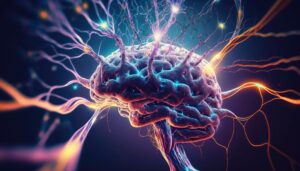Bipolar Disorder Treatment Online
from Board Certified Psychiatrists
Expert Virtual Mental Health Care Across 8 States
Bipolar disorder is a complex and often misunderstood mental health condition that can disrupt mood, energy, focus, and ability to function.
Feeling stuck in cycles of extreme highs and crushing lows? You’re not alone and you’re not out of options.
Our psychiatrists specialize in personalized, evidence-based care for bipolar disorder, helping you achieve emotional stability and a better quality of life. Whether you’re newly diagnosed or navigating treatment-resistant symptoms, we tailor each plan to meet your needs – right from the comfort of your home.
We provide virtual psychiatric treatment for all types of bipolar disorder, including:
- Bipolar I Disorder
- Bipolar II Disorder
- Cyclothymic Disorder
- Rapid cycling bipolar disorder
- Medication-resistant bipolar disorder
- Bipolar disorder with co-occurring ADHD, anxiety, or PTSD

What Is Bipolar Disorder?
Bipolar disorder is a mental health condition marked by intense shifts in mood, energy, and activity levels. These changes are more extreme than the normal ups and downs of life and can make it difficult to function at work, maintain relationships, or care for yourself. People with bipolar disorder experience alternating episodes of depression (feeling down, hopeless, or empty) and mania or hypomania (periods of elevated mood, high energy, or irritability).
The Two Main Phases of Bipolar Disorder
Depressive Episodes
These periods may involve overwhelming sadness, fatigue, hopelessness, changes in appetite or sleep, difficulty concentrating, and a loss of interest in daily activities.
Manic or Hypomanic Episodes
Manic episodes are marked by abnormally high energy, grandiosity, reduced need for sleep, impulsivity, or risky behavior. Hypomania is a milder version of mania but can still impair functioning.
Bipolar disorder is not a personality flaw or a result of moodiness – it’s a real medical condition with neurobiological roots. Without proper treatment, the condition can have a serious impact on work, relationships, finances, and overall well-being.
At Lifetime Insight, we understand how isolating and confusing bipolar disorder can feel – especially when symptoms cycle unpredictably. Our psychiatric care is built to help you regain stability and live a fulfilling life with the support of a treatment plan tailored just for you.
Bipolar types
Bipolar disorder exists on a spectrum and can present differently from person to person.
The condition is typically categorized into a few distinct types.
Bipolar I Disorder:
This involves at least one manic episode which may be preceded or followed by a major depressive episode. The manic episodes are intense and may even require hospitalization. Bipolar I is often more disruptive due to the severity of manic symptoms.
Bipolar II Disorder:
Defined by a pattern of hypomanic episodes (a less severe form of mania) alternating with major depressive episodes. Individuals with Bipolar II may not experience the same level of euphoria but often suffer longer and deeper periods of depression.
Cyclothymic Disorder:
Involves chronic, fluctuating mood disturbances with numerous periods of hypomanic and depressive episodes that don’t fully meet criteria for hypomanic or major depressive episodes. While less intense, these mood shifts are still significant and may affect relationships, productivity, and emotional regulation.
What Causes Bipolar Disorder?
The exact cause of bipolar disorder isn’t fully understood, but it’s widely believed to result from a complex interplay of genetics, brain chemistry, and environmental factors. Research has shown:
- Genetic predisposition: Individuals with a family history of bipolar disorder or other mood disorders are at greater risk.
- Brain structure and function: Neuroimaging studies suggest subtle differences in brain activity, particularly in areas related to emotional regulation and impulse control.
- Neurochemical imbalances: Irregularities in brain neurotransmitters may contribute to the mood swings seen in bipolar disorder.
- Stress and trauma: High-stress life events, including trauma, loss, or major transitions, can trigger or worsen mood episodes in vulnerable individuals.
Understanding these contributing factors can help reduce stigma and empower individuals to seek appropriate care.

Common Signs & Symptoms of Bipolar Disorder
Bipolar disorder is characterized by dramatic shifts in mood, energy, activity levels, and behavior. These changes are typically categorized as manic/hypomanic episodes and depressive episodes.
Manic or Hypomanic Episodes (vary in intensity):
- Elevated or irritable mood
- Inflated self-esteem or grandiosity
- Distractibility
- Increased activity, energy, or restlessness
- Decreased need for sleep
- Rapid speech or racing thoughts
- Impulsivity or poor decision-making (spending sprees, risky sex, substance use)
Depressive Episodes:
- Persistent sadness or hopelessness
- Loss of interest in usual activities
- Fatigue or low energy
- Sleep disturbances (insomnia or oversleeping)
- Changes in appetite or weight
- Trouble concentrating or making decisions
- Thoughts of death or suicide
The timing, duration, and severity of these episodes vary widely between individuals.
Some may experience long periods of stability between episodes, while others cycle more frequently.
How We Provide Online Bipolar Disorder Treatment
Diagnosing bipolar disorder requires a thorough psychiatric evaluation, as symptoms often overlap with other mood and anxiety disorders. Many individuals are misdiagnosed initially, especially if manic or hypomanic episodes are mild or not reported. At Lifetime Insight our evaluation process includes a comprehensive psychiatric assessment that includes:
1. Detailed clinical interview:
We review your psychiatric, medical, and family history, as well as past and current symptoms. Understanding the duration, frequency, and severity of mood episodes is critical for accurate diagnosis.
2. Integrative treatment plans:
When appropriate, short-term or ongoing treatments are proposed to support stabilization. All treatment plans are tailored and closely monitored.
3. Screening tools:
We may use validated questionnaires to help assess symptoms and identify patterns.
4. Collaborative input:
When appropriate and with consent, input from loved ones can provide valuable perspective on behavior changes that the individual may not recognize.
Bipolar Disorder Treatment Options
Bipolar disorder is a complex mood condition, and treatment must be tailored to the individual. At Lifetime Insight, we offer a comprehensive, integrative approach that combines evidence-based psychiatric care with lifestyle strategies and long-term support.
Integrative Treatment Plans
Traditional methods are often essential to stabilize mood and prevent future episodes. Depending on the specific diagnosis and presentation.
Treatment plans are customized to each patient’s needs, with careful monitoring to adjust as symptoms and circumstances evolve.
Psychoeducation and Support
Understanding the cyclical nature of bipolar disorder is crucial for long-term stability. Psychoeducation helps individuals and families recognize early warning signs, manage stress, and build protective routines. We work with patients to:
- Identify triggers and develop personalized relapse prevention plans
- Improve insight into shifting mood states and behavioral patterns
- Strengthen communication, self-awareness, and emotion regulation
- Reduce stigma and foster better relationships through education and support
While we don’t have in-house therapists, our psychiatrists are trained in psychotherapy and integrate these techniques into treatment sessions when appropriate. In some cases, we may also be able to provide ongoing therapy alongside traditional management, depending on availability and clinical fit. For patients seeking additional support, we are happy to refer you to trusted therapists in our extended network.
For individuals living with bipolar disorder, we especially recommend evidence-based therapeutic approaches such as Cognitive Behavioral Therapy (CBT) for mood tracking and thought restructuring, Acceptance and Commitment Therapy (ACT) for values-based action and psychological flexibility, and Mindfulness-Based Cognitive Therapy (MBCT) to enhance present-moment awareness and reduce depressive relapse.
Lifestyle & Self-Management Strategies
We support our patients with a variety of non-medication tools that enhance stability and overall wellbeing:
- Establishing consistent sleep-wake patterns to regulate mood
- Practicing mindfulness, breathwork, and structured routines to reduce reactivity and stress
- Following a nutrient-dense diet that supports brain function and lowers systemic inflammation
- Engaging in regular physical activity to boost mood and energy levels
- Exploring natural supplements that support mood, sleep, mitochondrial function, and circadian balance, based on research and individual tolerance
Is It Bipolar Disorder or Something Else?
Bipolar disorder shares features with conditions like depression, ADHD, and borderline personality disorder – making accurate diagnosis essential, and a misdiagnosis unfortunately very common in clinicians without the proper training, and can delay access to effective treatment.
Our psychiatrists are trained and experienced to differentiate between:
- Bipolar I vs. Bipolar II vs. cyclothymia
- Unipolar depression vs. Depression with mixed features
- Bipolar disorder vs. Borderline Personality Disorder
- Bipolar disorder vs. ADHD
- Bipolar disorder vs. mood symptoms caused by medical conditions or medications
Getting the accurate diagnosis is the foundation for effective care.


When to Reach Out for Help
If you suspect you may have bipolar disorder, it’s important to seek professional support -especially if you:
- Have been diagnosed in the past but aren’t currently in treatment
- Experience intense mood swings that impact your work, relationships, or daily life
- Struggle to stay stable despite past or current medications
- Notice impulsive, risky, or out of character behavior during high-energy phases
- Have frequent low periods marked by hopelessness, fatigue, or thoughts of self-harm
Bipolar disorder is highly treatable. Early, tailored intervention can dramatically improve stability, reduce symptoms, and help you reclaim control over your life.
Insurance, Self-Pay & States We Serve
- Most major insurance accepted: Blue Cross, Blue Shield, Cigna, Aetna, Anthem
- Proud Lyra Health partner, providing no-cost care for eligible employer-sponsored plans
- Self-pay: $495 for initial evaluation, $235 for follow-up visits
- We offer multi-state HIPAA-compliant telepsychiatry for adults in California, Florida, Nevada, Nebraska, Virginia, Colorado, Kansas, and Iowa
*Please note: We do not accept Medicare, Medicaid, Tricare, or UMR/Optum. UMR/Optum
Why Choose Lifetime Insight?
Care from board-certified psychiatrists with bipolar disorder expertise
No app downloads required, join securely from your browser
Appointments typically available within a week
Long-term, individualized care plans
Ongoing communication with your provider between visits
Take the First Step Toward Stability
Living with bipolar disorder can feel unpredictable, but you’re not alone and with the right treatment, stability is possible. Our psychiatrists provide online bipolar disorder treatment that’s personalized, respectful, and designed to help you live your life with confidence.
Schedule your first appointment today and start building a foundation for lasting wellness.
Latest Insights on Mental Health & Recovery

Low Dopamine: The Hidden Symptoms—and How to Feel Better
What Does Low Dopamine Really Feel Like? By Sarit Hovav, MD, FAPAPublished October 24, 2025 Facebook X-twitter Linkedin Envelope Low dopamine doesn’t always feel like

Inflammation and Depression: The Hidden Causes—and How to Feel Better
Beyond Brain Chemistry: The Body’s Role in Depression Feeling persistently low, foggy, or fatigued — even when life looks “fine” on paper — might not

CTE (Chronic Traumatic Encephalopathy): The Hidden Symptoms—And How to Heal
Caring for your brain health doesn’t end when the game does.If you’re a former athlete—or someone who loves one—and you’ve noticed mood swings, memory loss,
